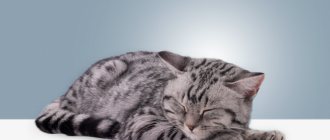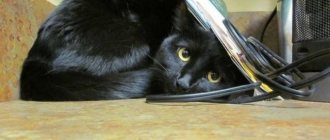Save the article:
No matter how hard a person tries to sleep longer, worries, affairs and responsibilities always interfere with him. But there is little that can distract cats from their dreams: on average, 16 hours a day they cause the envy of their owners, namely, they sleep serenely. If you calculate how much cats sleep during their lives, it turns out that they give 70% to sleep, and spend the remaining 30% on getting more tired and going to sleep.
Playing, tracking down prey, mastering new heights on the street or in the apartment - everything uses up a lot of cat energy, which can only be replenished by long and deep sleep.
Sleep standards for domestic cats
Each cat’s sleep norm is different: not only does it depend on the individual characteristics of the animal, but also on the energy expended during the day. One day the animal may be very tired from a long walk on the street, and on another day it may lie for half a day looking out the window - therefore, the duration of sleepy hours on these days will be different.
The total time allotted for dreaming can vary from 14 to 22 hours. What does total time mean: the pussy does not sleep “from bell to bell”, but easily alternates periods of sleep and activity. The cat gets the missing time in the arms of the owner and in any cozy corner. Cats sleep lightly, so they are easily interrupted by any loud sound, and, as if nothing had happened, they remain awake for some time, in order to soon fall asleep again.
Sleep norms for newborn kittens are different - they constantly doze next to their mother, waking up only to feed. Gradually, their waking hours increase, but they sleep somewhat less than adults. Older cats relapse into childhood and dream again constantly, waking up to litter and feed.
How long do adult cats sleep?
global $ads_google;
//data-ad-slot=”2475549904″ $ads_google = empty($ads_google) ? false : true; ?> if ($ads_google == false) {?> $ads_google = true; ?> } ?> If you compare how much an adult cat and a tiny newborn kitten sleeps per day , the kids will win. But then the emphasis shifts - the older ones sleep for a long time, and the kittens spend a lot of time playing.
For a healthy, tired cat, it will not be a deviation from the norm if he sleeps 20 hours in one day: his body may require such a long hibernation.
If an adult animal, which is one of the record holders for sleep among mammals, suddenly sleeps little, it means that it is in a state of stress. If this problem continues, the cat may lose a lot of weight and become ill due to nervousness.
In general, a cat needs to sleep 12-14 hours a day, but the total amount of hours spent on this is sometimes difficult to determine precisely because of the frequent alternation of periods of dreaming and activity.
How long do kittens sleep?
A healthy kitten at a tender age will easily sleep 22 hours in one day. This is not a reason to worry, but a variant of the norm. Age plays a significant role: if newly born kittens immediately fall asleep after eating, then cats at the age of one or two months play for a long time next to their mother, study the world around them and are in no hurry to fall asleep. A mother cat often spends much more time sleeping than her curious children.
If an older kitten sleeps a lot, and in addition to this, he has poor appetite and low activity, then this is a reason to consult a veterinarian with suspected illness.
What should I do if my cat's sleep habits change?
If you start to notice sudden changes in your cat's sleep habits, it's a good idea to have them checked by your veterinarian.
For example, if they start sleeping much more or less than before, this could signal that they are experiencing pain, gastrointestinal problems, or even depression.
However, if your cat starts going to the fresh litter box after you just changed the litter box, don't worry about it. For reasons unknown to researchers, kittens simply love the feeling of fresh litter under their feet.
While some people may think cats are a little lazy because of their sleeping habits, those who know them best realize that they are anything but lazy—they're just experts at slowing down and relaxing. The next time you're feeling stressed, rushed, and unable to concentrate, take your kitty's cue and relax with a nap of your own!
How long do cats sleep after anesthesia?
The behavior of pets and their condition after surgery always worries worried owners.
If a cat is about to be sterilized, then naturally the owner will be concerned about how much she will sleep after the operation. The body cannot ignore anesthesia, so after it and surgery it will take time to recover. Some creatures recover from anesthesia very quickly and wake up immediately, while others take longer.
If we are talking about a cat, then the question of how long he will sleep after castration also has an answer: it all depends on the individual characteristics of the pet’s body. In any case, he will need the care and attention of his owner. The veterinarian will definitely give important recommendations on this matter.
Sleep phases of cats
People who have cats in the house can constantly observe how a seemingly soundly sleeping pet suddenly jumps up and rushes at maximum speed to the kitchen, to the owner or to the door. For cats that have become well-adapted to resting during light naps, waking up abruptly is normal. These animals constantly pick up information from everywhere, so there is nothing strange in such a rapid succession of states.
Cat dreams are divided into two phases, which replace each other:
- slow phase: decreased blood pressure, low muscle activity, decreased heart rate, slow breathing. The eyes under closed eyelids, at the moment of falling asleep, slowly move a little and then stop
- fast phase: rapid heartbeat, change in breathing rate, rapid rotation of the eyes, slightly increased blood pressure and body temperature, possible shudders, movement of the limbs and ears.
The fast phase in adult cats takes up to 25% of the total time, in old cats 15%. The slow phase lasts 20-30 minutes, and then it is replaced by a fast phase for 5-7 minutes. Over a long period of sleep, the phases alternate several times.
Do cats dream?
global $ads_google;
//data-ad-slot=”2475549904″ $ads_google = empty($ads_google) ? false : true; ?> if ($ads_google == false) {?> $ads_google = true; ?> } ?> How much time cats sleep per day has been determined, now it’s interesting to find out whether four-legged friends have dreams. Neuroscientists studied this issue and came to the conclusion that domestic cats are no strangers to dreams. This is usually something that has to do with the cat's lifestyle. This could be a battle with a wild relative, an active pursuit of prey, exploration of a new territory, or something associated with strong emotions.
How and when do cats sleep?
If a cat does not sleep at the required hours, being in a relaxed state, but looks for a secret place for dreams, it means that she is not so comfortable next to her owner. Normally, a cat would rather prefer the master's bed than the corner under the sofa. An animal that completely trusts its owner easily falls asleep on his lap, turning over on its back and putting all four paws in front of it.
When a cat is 9 years old, she slept for about 6 years of that time.
The place to sleep will most often be located at some elevation, and it will be something soft and warm. The cat will stomp on the chosen bed, stretch, relaxing every muscle, and very quickly falls asleep.
There are also originals among cats, which seem to be smeared with honey on the owner’s laptop, important documents on the table or freshly ironed linen.
Interesting Facts
It may seem funny, but cats are capable of dreaming. Felinologists (specialists who study the physiology, behavior and characteristics of domestic cats) claim that the dreams of these animals can be quite plot-based. This is evidenced, in particular, by the behavior of pets in their sleep. Based on the characteristics of the dream, sleeping animals can move their paws, move their ears, frown and even make sounds.
Some cats sleep with their eyes open, which often frightens their owners. In some cases, this may be due to the peculiarity of the position in which the animal fell asleep. Sometimes in a dream, cats adopt a body position in which the eyelid or eyelids are pulled back under the weight of the animal. This often happens during very deep and sound sleep.
If a cat sleeps with its eyes open sporadically, then this should not cause alarm. However, in cases where such a phenomenon is observed regularly, the animal must be shown to a veterinarian. In some cases, sleeping with your eyes open may indicate the development of problems such as glaucoma, increased intracranial pressure, and facial paralysis. Many cats prefer to sleep on their back, which cannot be called the most comfortable and physiological position for them.
The duration and frequency of a cat's sleep are highly individual parameters, depending on the unique characteristics of the animal. If your pet leads a measured lifestyle, preferring to doze off most of the time, curled up in a corner, you should not worry about his health. Moreover, you should not wake your cat because you think it is sleeping too much during the day. Such actions can disrupt the natural biological clock to which the animal’s body is accustomed.
You can learn more about a cat's sleep pattern in the following video.
Cats sleeping problems
In cases where a cat, not exceeding its usual sleep norm, suddenly begins to constantly doze off and look drowsy, it is first determined whether this is due to pregnancy or weather conditions (excessive heat or extreme cold). If a cat spends more than 18 hours sleeping, then such drowsiness may come from some kind of disease. A cat's sleeping position can help identify the problem: a frozen posture like a sphinx or attempts to spread its limbs that are unusual for an animal indicate hyperthermia. Also, an excessive amount of sleep is an indicator of the onset of heart problems.
Other sleep disorders include insomnia. Stress caused by moving, the arrival of a new family member, or an influx of guests may be to blame here. Sometimes cats have seizures in their sleep - it’s better to film any oddities and then show it and the animal to a veterinarian.
Favorite vacation spots
Cats choose a place to sleep carefully: it should be quiet, comfortable and cozy. It is important for an animal to always have access to its favorite place and know that it will not be disturbed there. That’s why your furry pet often chooses secluded corners for relaxation: armchairs, sofas, beds, and even the shelves of an open wardrobe. Cats usually have several favorite places, which they happily alternate. Despite the careful choice of sleeping place, sometimes pets sleep where they fell asleep after a hearty lunch. For example, on the floor, on the refrigerator or in other unusual places.
Sometimes cats choose unusual places for bed
A cat's dream close to its owner speaks of sympathy and affection. Pets love to settle next to a person while sleeping: at the head of the bed, at the foot of the bed, at arm's length, or on the owner himself. Sometimes, when choosing a place to rest, a cat is guided by the desire to be closer to the warmth, and therefore settles down near the heaters.











